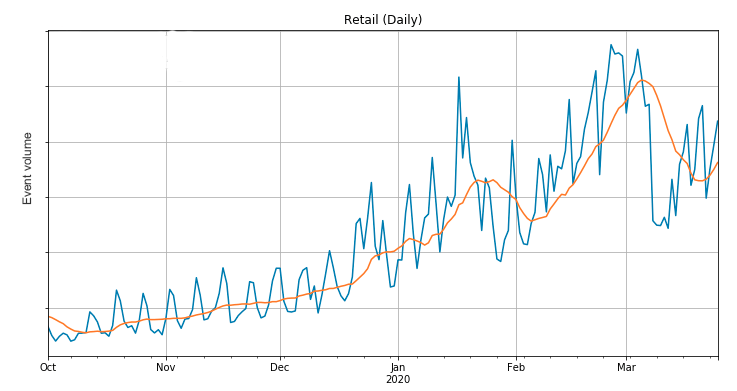Ekata is a data company. Data is the foundation of our beginning and our growth. When we find uncertainty, we look to the data for answers. In a time of such acute global uncertainty, we turned to the data with our questions: What are the current trends in online fraud for online businesses? Given the learnings we gauge, what is the best path forward for our customers?
To answer these questions, we will embark on a 3-part series to look at the impacts of COVID-19 on digital commerce and fraud patterns, how fraudsters have adapted to the “new normal,” and what our data says about how to identify and block fraudulent behavior.
Online Shopping is Up
First, let’s look at some statistics. Global lock downs and stay at home orders force an increasing number of people to shop online, leveraging shipping and delivery services. We see traffic surges most notably across eCommerce companies delivering essential goods and entertainment. Not only are shoppers going online when they can’t visit brick and mortar stores, but many are at home looking for something to do, and are purchasing various forms of entertainment.
Stories and examples of the sudden growth of online shopping are rampant in the media. Instacart announced plans to add 250,000 personal shoppers to their network in order to meet consumer demand. Similarly, the graph below, published by NuData Security, a Mastercard company, is an excellent example of recent ecommerce shopping trends (blue) exceeding average traffic (orange) for this time of year.

eCommerce companies aggregated traffic. Orange indicates 14-day average traffic.
https://nudatasecurity.com/resources/blog/how-covid-is-affecting-online-traffic-and-other-graphs/
Where have the fraudsters gone?
Unfortunately, nowhere. There are a very large number of scams targeting the folks that are stuck at home. Fraud often targets elderly generations, and COVID-19 induced fraud is no exception. AARP submitted a warning that more than 23,800 fraud complaints have been logged by the Federal Trade Commission (FTC) related to the outbreak. Nearly $30 million in losses have been reported, with a median loss of $500. Of course, this is not a localized issue, but a global one, with multiple news and government agencies reporting a 40% jump in complaints about fake goods and other Covid-19-related scams since early March.
And what about the fraud we saw before the pandemic started? It’s still there, but fraudulent volume has been drowned out by the dramatic increase of genuine shoppers. We looked to our own data to see just how high online activity was. We saw query volume for our identity verification products in comparison to volume for one of the most “predictable” online buying seasons of the year, Black Friday. Each query represents an inquiry one of our customers made to identify a user on their platform as legitimate or fraudulent.
Query volume from our customer sites has been consistently higher than a typical Black Friday season, with the exception of the actual Black Friday weekend and Cyber Monday. Therefore the sheer volume of legitimate shoppers here dwarfs the fraudsters.
But fraud, like mother nature, always finds a way. In this case, fraud is turning it’s focus to finding ways to open new fraudulent accounts, take over existing legitimate accounts, and abuse promotions. Unfortunately, fraudsters also look at the data, and analyze the ‘new’ shopping habits occurring right now. They are using the data to find loopholes in business systems and opportunities in activity then taking advantage of them both to commit fraud.
For the next article in this series, we will look at what our data tells us about the true nature behind this increased volume. Is this dramatic increase in online behavior overwhelmingly legitimate, honest shoppers, or is fraud increasing as well? How can you spot fraud when there are so many new shoppers and transaction patterns of those shoppers? The answer lies in determining not just who the shopper is, but what types of online activity they exhibit.
If you’d like to hear more about the fraud patterns Ekata is seeing and how to engage with your best customers while protecting your business from fraud in these unprecedented times, contact us.



